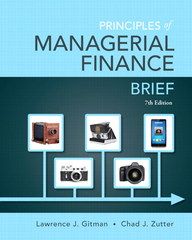Question
You have been at your job with East Coast Yachts for a week now and have decided you need to sign up for the companys
You have been at your job with East Coast Yachts for a week now and have decided you need to sign up for the companys 401(k) plan. Even after your discussion with Sarah Brown, the Bledsoe Financial Services representative, you are still unsure as to which investment option you should choose. Recall that the options available to you are stock in East Coast Yachts, the Bledsoe S&P 500 Index Fund, the Bledsoe Small-Cap Fund, the Bledsoe Large-Company Stock Fund, the Bledsoe Bond Fund, and the Bledsoe Money Market Fund. You have decided that you should invest in a diversified portfolio, with 70 percent of your investment in equity, 25 percent in bonds, and 5 percent in the money market fund. You have also decided to focus your equity investment on large-cap stocks, but you are debating whether to select the S&P 500 Index Fund or the Large-Company Stock Fund.
In thinking it over, you understand the basic difference in the two funds. One is a purely passive fund that replicates a widely followed large-cap index, the S&P 500, and has low fees. The other is actively managed with the intention that the skill of the portfolio manager will result in improved performance relative to an index. Fees are higher in the latter fund. Youre just not certain of which way to go, so you ask Dan Ervin, who works in the companys finance area, for advice.
After discussing your concerns, Dan gives you some information comparing the performance of equity mutual funds and the Vanguard 500 Index Fund. The Vanguard 500 is one of the worlds largest equity index mutual funds. It replicates the S&P 500, and its return is only negligibly different from the S&P 500. Fees are very low. As a result, the Vanguard 500 is essentially identical to the Bledsoe S&P 500 Index Fund offered in the 401(k) plan, but it has been in existence for much longer, so you can study its track record for over two decades. The graph below summarizes Dans comments by showing the percentage of equity mutual funds that outperformed the Vanguard 500 Fund over the previous 10 years. For example, from January 1977 to December 1986, almost 70 percent of equity mutual funds outperformed the Vanguard 500. Dan suggests that you study the graph and answer the following: 1.) What implications do you draw from the graph for mutual fund investors? 2.) Is the graph consistent or inconsistent with market efficiency. Explain. 3.) What investment decision would you make for the equity portion of your 401k account? Why?
Step by Step Solution
There are 3 Steps involved in it
Step: 1

Get Instant Access to Expert-Tailored Solutions
See step-by-step solutions with expert insights and AI powered tools for academic success
Step: 2

Step: 3

Ace Your Homework with AI
Get the answers you need in no time with our AI-driven, step-by-step assistance
Get Started


